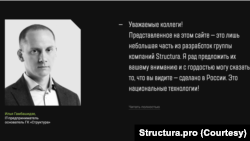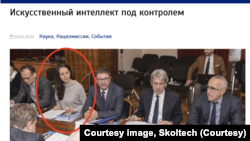According to the U.S. government, Russian political consultant Ilya Gambashidze is responsible for a large-scale disinformation campaign aimed at undermining trust in democratic processes and institutions in the United States and beyond.
Working with Kremlin officials, his digital marketing agency creates fake news sites — sometimes clones of real news outlets to mislead people, the government alleges. Often, the goal appears to be reducing Western support for Ukraine.
In March 2024, the U.S. Treasury Department, following the European Union’s lead, imposed sanctions on Gambashidze, his business partner, and their companies.
This increased attention to the little-known political strategist, who had previously worked for Russian lawmakers and regional politicians. For the most part, though, his biography remained largely unknown.
Now, in a new investigation based upon scouring Russian state databases, business records in Russia and Europe, and social media posts, Voice of America can reveal more about Gambashidze’s path from consultant to alleged disinformation mastermind and his ties to the United States.
From 2013 to 2020, companies owned wholly or partially by Gambashidze, or a close family member received Russian government contracts worth about $2.7 million. And these were not the only companies owned by the political strategist.
Although Gambashidze’s work appears aimed at destabilizing the social and political situation in America, his two sons live in the United States.
VOA learned this through an assiduous search of public records and social media. Gambashidze’s ex-wife, who has been living in the U.S. for roughly 15 years, then confirmed the information. VOA is not naming them to protect the sons’ privacy.
Gambashidze’s ex-wife and her current husband say that economic sanctions on the “political technologist” have largely been a blow to his children because they have made it impossible to collect child support from Gambashidze.
"In our opinion, the only thing these sanctions do is hurt the lifestyle of his kids, which is very modest,” said their stepfather. “They just go to public school, community college.”
VOA’s investigation shows the close connection between Russian business interests and the Kremlin's foreign policy, and demonstrates the ties between people working to discredit Western institutions and the West itself.
Voice of America reached Gambashidze by phone in Moscow, but he declined to comment and requested the questions by Telegram messenger. He did not respond to that message.
What’s known about Gambashidze
Although it is difficult to reconstruct Gambashidze’s full biography from open-source information, a general portrait emerges.
Gambashidze was born in Kyiv in 1977, according to information from the Office of Foreign Assets Control, or OFAC, which is responsible for enforcing U.S. sanctions, as well as business documents seen by Voice of America.
In 2008, he defended his PhD dissertation in sociology at the Russian State University for the Humanities. The title of his research was: “Features of the development of local self-government in the Russian Federation in the context of the transformation of the party system.”
A year later, Gambashidze was working as an assistant to the prefect of Moscow’s Northern District, when he became the victim of a strange kidnapping attempt. His ex-wife and children appear to have lived in the United States since around that time.
Gambashidze remained in Russia, where he worked as an adviser to Pyotr Tolstoy, deputy chairman of the State Duma and the great-great-grandson of the famed author Leo Tolstoy.
According to media reports, Gambashidze also worked for the Batu Khasikov, the acting governor of Kalmykia, a traditionally Buddhist minority region in Russia’s North Caucasus.
In 2023, on the eve of Russian parliamentary elections, Gambashidze was working for the Liberal Democratic Party of Russia, or LDPR, a nationalist political party that is part of Russia’s pro-Putin “opposition.”
That same year, the Russian Association of Political Consultants awarded his teams prizes for three electoral projects. Two were unusual: a monument to LDPR founder Vladimir Zhirinovsky, who died in 2022, and a May Day rally in the hit computer game Minecraft and the “Neural Network Zhirinovsky.”
The latter project is a digital image, supposedly based on AI, that can answer questions in the aggressive style and voice of Zhirinovsky.
In March 2024, before Russian presidential elections, a humorous music video urging residents of the central Russian city of Tambov to get out to vote appeared online.
That video was the work of Gambashidze’s team, one of his associates later wrote.
In the video, young men and women in Russian folk outfits dance alongside people in bear and wolf costumes, play the accordion and balalaika, and sing in English (with a nearly indecipherable Russian accent) about their desire to vote.
“Custom [of] folk in our nation — we all go to voting station,” they sing. “There is no autocracy, we live in democracy!”
Independent experts and Western governments sharply disagree with that assessment.
Kremlin disinformation
Since 2022, social media companies, researchers, Western governments and journalists have increasingly linked Gambashidze’s two companies to a project to spread disinformation in Ukraine, Europe, Latin America and the United States.
In November 2022, Meta announced it had removed more than 2,300 accounts and pages on Facebook and Instagram for “coordinated inauthentic behavior.”
The accounts shared content from websites posing as real media outlets and government pages. These articles “criticized Ukraine, praised Russia and argued that Western sanctions on Russia would backfire,” Meta wrote.
The targets of the disinformation were Europe and Ukraine. European officials later named the campaign “Doppelganger.”
Meta tied the campaign to two Russian firms: marketing company Social Design Agency, or SDA, and IT firm Structura, which together spent approximately $105,000 on advertising on Facebook and Instagram.
According to the Treasury Department, SDA was founded by Gambashidze (it is formally registered to a woman likely associated with his political work in Tambov).
Gambashidze was also co-founder of Structura, but today it belongs to Nikolai Tupikin, who is even less well-known. There is only one “official” photo of him from a Russian Telegram channel dedicated to startups. Little other information is available.
Tupikin declined to comment when Voice of America contacted him by phone. He did not respond to a subsequent emailed request for comment.
In July 2023, the EU imposed sanctions against Gambashidze, SDA and Structura.
In November 2023, amid the Israel-Hamas war, Stars of David began to appear on walls in Paris. The images circulated actively on social media. French police soon detained two Moldovan citizens for painting the Jewish symbols. They had allegedly been acting on behalf of a pro-Kremlin businessman in Transnistria, a breakaway region of Moldova.
The French authorities accused the Doppelganger campaign of trying to provoke tensions in France by sharing photos of the stars. The Russian Embassy in Paris denied the allegations.
Later, French newspaper Le Monde reported that the country's intelligence agency suspected Russia’s Federal Security Service of orchestrating the provocation.
In November 2023, the U.S. State Department's Global Engagement Center accused Gambashidze, Tupikin and their firms of launching a large-scale disinformation campaign in Latin America on the orders of the Kremlin.
In a series of articles based on leaked Kremlin documents, The Washington Post painted an even clearer picture of Doppelganger.
The team of political technologists behind the campaign work under Sergei Kiriyenko, the first deputy head of Russia’s Presidential Administration, who normally is responsible for overseeing domestic policy.
They used the services of bot farms that sometimes posted on social networks while posing as ordinary U.S. residents who oppose American support for Ukraine. The bots tried to stir up fear about border security, increase racial and economic tensions, and support isolationism in the United States, The Washington Post reported.
To that end, the campaign resembled the “Russian troll factory” that was accused of meddling in the 2016 U.S. presidential election.
According to the Post’s source, the coordinator and “brain” of the European and Ukrainian disinformation campaign is Sofia Zakharova, a Kremlin official who works in an office focused on information technology and communications infrastructure.
Little is known about Zakharova. However, according to a social media post documenting the official’s meeting with students, she is a graduate of Russia’s Diplomatic Academy and has experience working in the Presidential Administration, Foreign Ministry, and the United Nations.
Voice of America was unable to contact Zakharova through the Presidential Administration and the Russian Embassy in the United States.
Judging by publicly available information, since 2019, Zakharova has regularly taken part in conferences and events dedicated to artificial intelligence. On at least two occasions, she represented her agency in meetings of the Council of Europe’s Ad Hoc Committee on Artificial Intelligence.
“The dominant conversation across global elections so far this year centers on malicious use of generative AI for propaganda and disinformation,” the Microsoft Threat Intelligence Center noted in a recent report.
Researchers from George Washington University recently predicted that incidents of “bad-actor AI activity” will become a daily occurrence by mid-2024. According to Microsoft, though, the technology has not yet demonstrated significant effectiveness in terms of spreading misinformation.
Gambashidze is also not far from AI. In a recent comment to the Russian sociological agency Russian Field, he suggested that political technologists “will begin to actively use AI to collect and process information from the Internet: they will study comments on social networks and the tone of posts, evaluate articles in the media, and so on.”
“Yes, of course, bot farms and political orders will give some kind of error,” added the political strategist, “but the overall picture will be clear.”
Political technology and PR
In addition to working for politicians and the Kremlin, over the past decade Gambashidze has entered into various areas of business. Since 2013, his companies have repeatedly won public procurement tenders.
Gambashidze owned a one-third share in a company named Deep Communication. According to the official Russian state procurement portal, in 2014-2016, it won 12 contracts worth about $1.76 million at the 2016 exchange rate.
In 2014, the company U.S.P.R., owned by Gambashidze and a business partner, received a government contract worth around $83,000 based upon the average exchange rate that year.
From 2013 until 2017, the Energy company, owned by Gambashidze, received 15 government contracts worth almost $975,000. The Etude company, owned by a close relative (presumably his mother), received one contract for roughly $25,000 in 2020.
Some of the services provided by Gambashidze's companies were predictable given his line of work: maintaining websites, public opinion research, advertising, conducting focus groups, etc.
There also were more unexpected tasks: According to one of the contracts, Deep Communication was involved in the production of the film called “Jasmine,” which received government funding. Judging by the information in the contract and data from open sources, “Jasmine” refers to the film “Hit” directed by Margarita Mikhailova, which was released in 2016.
Film appears in Gambashidze’s biography more than once. Deep Communication also worked on the Kyrgyz-Russian film Suleiman-Too, and for unclear reasons, Gambashidze shows up in the background of a photograph of American actor Zac Efron arriving at the 2012 Cannes Film Festival.
In total, Gambashidze’s companies received state contracts worth more than $2.7 million according to the average 2016 exchange rate. Almost all companies that received these contracts have since been liquidated.
When the US Treasury imposed sanctions on Gambashidze in March 2024, it froze two cryptocurrency wallets. According to researchers from Chainalysis, the wallets had received approximately $200,000 in cryptocurrency. A significant portion was transferred through Garantex, a sanctioned cryptocurrency exchange.
Gambashidze also owned several companies that did not receive government contracts. Their areas of activity appear to include the restaurant industry, insurance, and even a “reading aloud championship.”
Additionally, Gambashidze is the owner of the Bulgarian company "Moi Bryag" ("My Shore"), which he took over from his father. According to official financial statements, the company never made any money.
The likely website of this company, which appears to have previously had an office in Moscow, is no longer accessible, but archived versions of the site indicate that “My Shore” advertised real estate on the Black Sea coast of Bulgaria and in Greece.
According to Bulgarian documents, Gambashidze’s father has an apartment in the Bulgarian city of Byala.
If the Bulgarian companies were once used by Gambashidze to preserve assets or generate income, today they are inaccessible to him because of sanctions. And, according to his ex-wife’s family in the U.S., this creates problems for his American children.
The only way to receive child support from Gambashidze is to obtain a special license from the U.S. Treasury, the mother and stepfather of Gambashidze’s children say. So far, this has not been possible.
The sanctions affected “only his [Gambashidze’s] children, who are U.S. citizens and good students,” their stepfather said. “They don’t live in Russia, they live here permanently. They are completely American. It harms them the most.”















